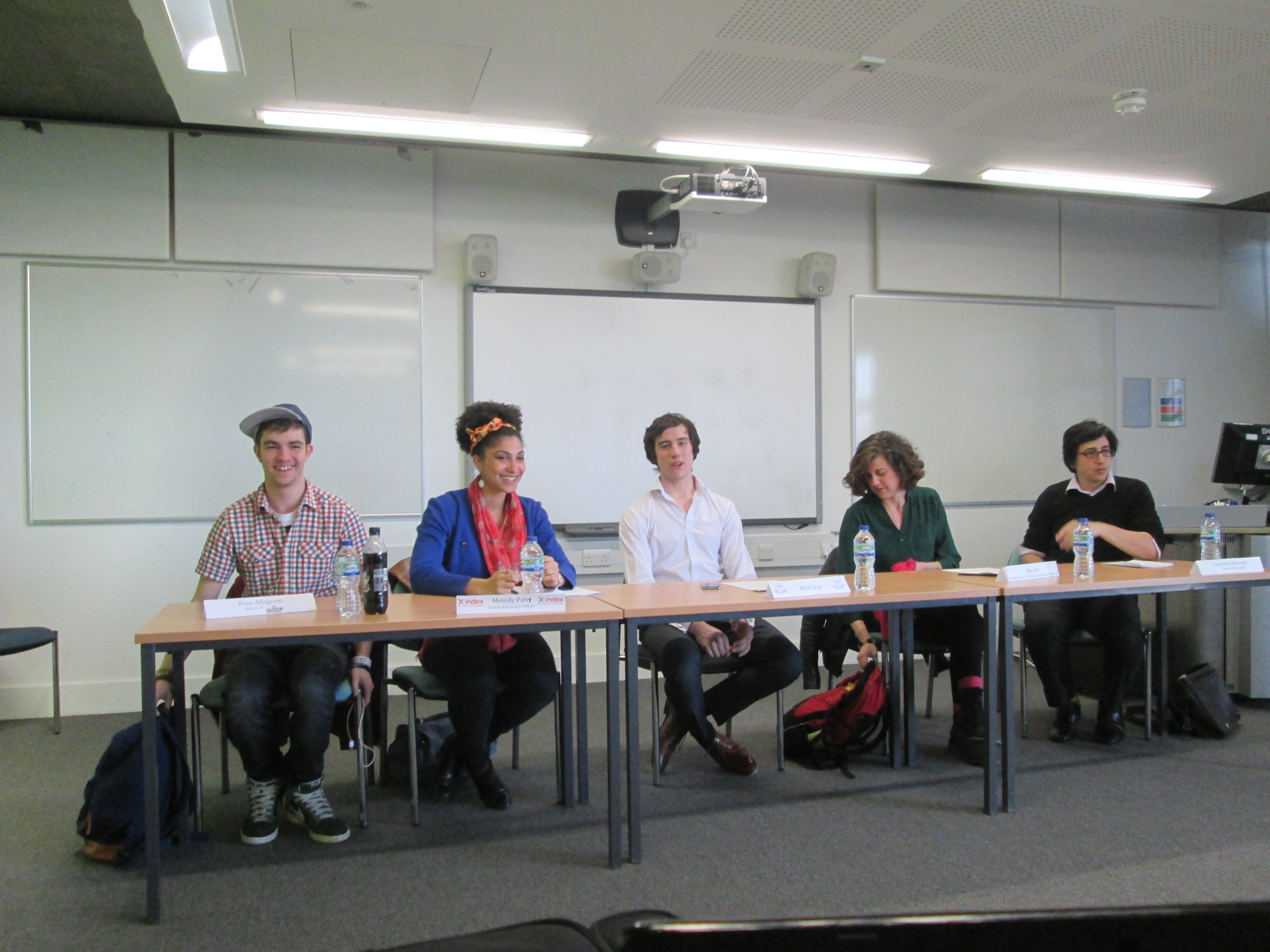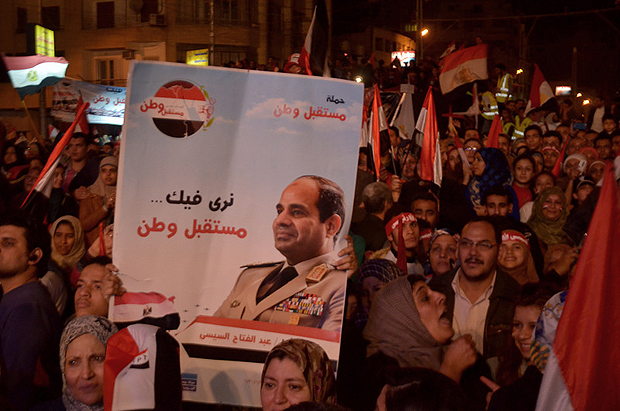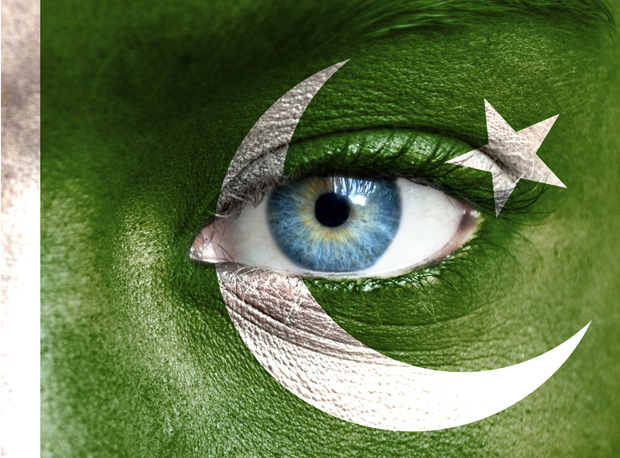Recap report: The right to protest! The right to fight?



Since Mohamed Morsi’s ouster in July 2013, backed by the army and General Abdel Fattah al-Sis, there has been a rise in the number of arrests of people based on their sexual orientation (Image: Adham Khorshed/Demotix)
A Cairo misdemeanour court on Monday sentenced three men to eight years in prison “for committing homosexual acts”. A fourth defendant in the case was sentenced to three years in prison with hard labour.
The men were allegedly found dressed in women’s clothes and wearing make-up when they were arrested last month, following a police raid on a private apartment in Cairo’s northern residential suburb of Nasr city. The apartment had been a meeting place for some members of Egypt’s gay community, who had been attending a party there when the raid occurred.
During Monday’s court session, prosecutors said one of the defendants had rented the apartment to receive “sexual deviants” in his home and host parties for them. While there are no laws banning homosexuality in Egypt, “debauchery” or breaking the country’s law of public morals is outlawed. Egyptian courts use legislation on debauchery to prosecute gay people on charges of “contempt of religion” and “sexual immorality”.
The severe sentences the four men received on Monday have raised concerns among rights campaigners of a widening crackdown on Egypt’s long-oppressed and marginalised gay community. Youth-activists expressed their dismay and disappointment at the verdicts on social media networks. In a message posted on her Twitter account on Tuesday, Shadi Rahimi, a journalist and photographer working for Al Monitor described the verdicts as “outrageous”. Blogger Nervana Mahmoud meanwhile said: “The verdicts demonstrate that the current regime is as conservative as their Islamist predecessors.”
In Egypt’s conservative, predominantly Muslim society, homophobia is deeply embedded, with 95% of Egyptians sharing the conviction that “homosexuality should not be accepted”, according to a 2013 poll conducted by the Pew Research Centre.
The recent crackdown on Egypt’s gay community is highly reminiscent of the security clampdown in the spring/summer of 2001 when authoritarian president Hosni Mubarak was still in power. In May 2001, 52 people suspected of being gay were arrested on charges of immorality during a raid on a tourist boat moored on the Nile in Cairo. Twenty three of the men were sentenced to up to five years in prison with hard labour. The highly-publicised “Queen Boat case”, named after the discotheque-boat that for long had been a known meeting place for Egypt’s gay community, signalled what rights campaigners feared might be an end to long years of discreet and quietly tolerated public activity by the country’s threatened LGBT population. Some analysts said at the time that the sudden crackdown was a means of diverting attention away from the regime’s failures, including a political crisis and a looming economic recession. Critics of the 2001 crackdown also believed it was an attempt by the then-autocratic regime to present an image as “the guardian of public virtue so as to deflate an Islamist opposition movement that appeared to be gaining support every day”.
Not surprisingly, many of Egypt’s gay men and women were at the heart of the January 2011 protests demanding democracy, freedom and social justice. They had hoped that the revolution would usher in a new era of change including greater freedoms and tolerance, allowing them to better integrate into mainstream society. Karim, who requested that only his first name be used out of concern for his safety, told Index: “We had a lot of hope then but the last three years have only brought disappointment. There has been no change in people’s attitudes. In fact, we get insulted more often now, as people feel emboldened knowing that the authorities are siding with them.”
Rights campaigners agree that life has gotten worse for Egypt’s gay citizens since the Arab Spring. Adel Ramadan, a legal officer at the Cairo-based Egypt Initiative for Personal Rights told NBC News last year that “after the fall of Mubarak, the criticism of revolutionary groups has always contained a sexual element. Women who participate in protests are often called prostitutes or ‘loose’ women, while male revolutionary activists are called homosexuals”.
Meanwhile, the rise of Islamists to power in Egypt in the post-revolution era fuelled fears among rights groups and Egyptian gay citizens over greater restrictions on the gay community. They anticipated an even harder crackdown under Islamist rule and worried that the Islamist-dominated parliament would pass anti-gay legislation. Whether or not their fears were justified is uncertain, for Islamist rule in Egypt was short lived, lasting only one year. President Morsi was toppled by military-backed protests on July 3, 2013 and the People’s Assembly (the lower house of Parliament responsible for issuing legislation) was disbanded by a Supreme Constitutional Court ruling in June 2012, only a few months after its members were elected. However, in their time in power, there were signs indicating a potential tightening of restrictions on Egypt’s gays. In August 2012, a man was arrested for allegedly leading a “gay sex network” while later that year, vigilantes beat four men suspected of being gay before handing them over to the police.
“Many of my gay friends fled the country when the Islamists came to power; they were terrified of what would happen to them under Islamist rule. They knew they would not be able to live freely so they emigrated,” said Karim. “Those who stayed behind, participated in the 30 June mass protests demanding Morsi’s downfall. We were overjoyed when he was toppled and hoped there would be fewer restrictions on us from then on,” he added.
Paradoxically, since Morsi’s ouster in July 2013, there has been a rise in the number of arrests of people based on their sexual orientation, according to the US-based Human Rights First group. The group says the surge in arrests and prosecution of gay men and women is part of the military-backed regime’s efforts to reassure Egyptians that the current regime is as conservative as any Islamist party.
In October 2013, state-owned Akhbar el Youm reported that at least 14 men were arrested for “practicing homosexuality” after a raid on a health club in El Marg district in northeastern Cairo. According to the weekly newspaper, police found the men “in positions that were against religious precepts”. Less than three weeks later, police arrested ten more people on “homosexual-related charges”. The arrests occurred during a police raid on a private party held to celebrate Love Day (Egypt’s equivalent of Valentine’s Day) in Cairo’s western suburb of 6 October. The men were subjected to humiliating anal examinations before being convicted of prostitution and sentenced to between three and nine years in prison. Mohamed Bakier, one of the defence lawyers in the case, said the charges against them were “political rather than criminal”. He added that the harsh sentences they received were meant to deliver a message that the society is still conservative.
Similarly, the severe sentences handed down to the four men on Monday may be an attempt by the military-backed authorities to appease a sceptical public and win over conservatives in the deeply polarised society ahead of upcoming presidential elections in which the former defence minister Abdel Fattah El Sisi is the lead contender.
The verdicts, meanwhile, coincided with another court ruling upholding three-year jail terms imposed on three secular revolutionary activists convicted of organising or participating in unauthorised protests, prompting rights campaigners to concur in opinion that this is all part of the wider, ongoing crackdown on personal freedoms.
Whatever the motives are behind the harsh sentences, one thing is certain: The verdicts have increased anxiety over the insecurity of Egypt’s vulnerable gay community. “We no longer feel safe,” said Karim. “We know we are being targeted by the police and sooner or later, they will come after us.”
An earlier version of this article incorrectly stated that the 52 Egyptians were arrested in May 2010. The incident took place in May 2001.
This article was posted on 9 April 2014 at indexoncensorship.org

(Photo illustration: Shutterstock)
Retaining data is the reflex of a functioning bureaucracy. What is stored, how it is stored, and when it is disseminated, poses the great trinity of management. These principles lurk, ostensibly at least, under an umbrella of privacy. The European Union puts much stake in Article 8 of the European Convention on Human Rights, stressing the values of privacy that covers home, family and correspondence. But there are also wide qualifications – interferences are warranted in the interest of national security and public safety, allowing Member States, and the EU, a degree of room to gnaw away at privacy rights.
That entitlement to privacy has gradually diminished in favour of the “security” limb of Article 8. The surveillance narrative is shaping privacy as a necessarily circumscribed right. The realm of monitoring and surveillance is being extended. Technologies have proliferated; laws have remained, if not stagnant, then ineffective.
Unfortunately for those occasionally oblivious drafters of rules in Brussels, the judges of the Court of Justice of the EU did not take kindly to the Data Retention Directive, which requires telecommunications and internet providers to retain traffic and location data. That is not all – the directive itself also retains data identifying the user or subscriber, a true stab against privacy proponents keen on principles of anonymising users.
The objective of the DRD, like so many matters concerned with bureaucratic ordering, is procedural: to harmonise regimes of data retention across various member states. More specifically, Directive 2006/24/EC of the European Parliament and of the Council of March 15 2006 deals with “retention of data generated or processed in connection with the provision of publicly available electronic communications services or of public communications networks”.
Other courts have expressed concern with the directive, which propelled the hearings to the ECJ. These arose from separate complaints in Ireland and Austria over measures taken by citizens and parties against the authorities. The Irish case began with a challenge by Digital Rights Ireland in 2006. The Austrian legal challenge was pushed by the Kärntner Landesregierung (Government of the Province of Carinthia) and numerous other concerned parties to annul the local legislation incorporating the directive into Austrian law.
The Constitutional Court of Austria and the High Court of Ireland shook their judicial fingers with rigour against it – the judges were not pleased. The disquiet continued to their brethren on the ECJ, which proceeded to make its stance on the scope of the retention law clear by declaring it invalid. EU officials should have seen it coming – in December last year, the Advocate General of the ECJ was already of the opinion that the DRD constituted “a serious interference with the privacy of those individuals” and a “permanent threat throughout the data retention period to the right of citizens of the Union to confidentiality in their private lives.”
The defensive stance taken by the authorities is so old it is gathering dust. Technology changes, but government rationales never do. Invariably, it is two pronged. The ever pressing concerns of security forms the first. The second: that such behaviour does not violate privacy – at least disproportionately. You will find these principles operating in tandem in each defence on the part of authorities keen to justify extensive data retention. Such intrusive measures have as their object the gathering of information, rather than the gathering of useful data. The usefulness is almost never evaluated as a criterion of extending the law. Instinct, not evidence, is what counts.
The rationale of the first premise is simple enough: information, or data, is needed to fight the shady forces of crime and terrorism. Better data retention practices equates to more solid defence against threats to public security. The ECJ acknowledged the reason as cogent enough – that data retention “genuinely satisfies an objective of general interest, namely, the fight against serious crime and, ultimately, serious security.” The authorities were also keen to emphasise that such a regime of retention was not “such as to adversely affect the essence of the fundamental rights to respect for private life and to the protection of private data.”
In dismissing the main arguments of the authorities, the points of the court are clear. In retaining the data, it is possible to “know the identity of the person with whom a subscriber or registered user has communicated and by what means”. Identification of the time of the communication and place form which that communication took place is also possible. Finally, the “frequency of the communications of the subscriber or registered user with certain persons during a given period” is also disclosed. Taken as a whole set, these composites provide “very precise information on the private lives of the persons whose data are retained, such as the habits of everyday life, permanent or temporary places of residence, daily or other movements, activities carried out, social relationships and the social environments frequented.” Former Stasi employees would be swooning.
The judgment provides a relentless battering of a directive that should never left the drafter’s desk. “The Court takes the view that, by requiring retention of those data and by allowing competent national authorities to access those data, the directive interfered in a particularly serious manner with the fundamental rights to respect for private life and to the protection of personal data.”
The laws of privacy tend to focus on specificity and limits. If there is to be interference, it should be proportionate. The directive had failed at the most vital hurdle – if privacy is to be interfered with, do so in even measure with minimal interference. The DRD had, in effect “exceeded the limits imposed by compliance with the principle of proportionality.” The decision is unlikely to kill off regimes of massive data retention – it will simply have to make those favouring surveillance over privacy more cunning.
This article was posted on April 9, 2014 at indexoncensorship.org

(Image: Aleksandar Mijatovic/Shutterstock)
In the sixth attack on Express Media employees unknown assailants threw a hand grenade at the gate of Express News bureau chief’s house in Peshawar’s Murshidabad area. Though no one was injured in Sunday’s incident, it highlights the dangers for Pakistan’s journalists.
“It was 6:30 am. I woke up to a loud screeching made by a motorbike, followed seconds later by a thunderous sound. I ran out and saw a cloud of smoke,” said 38-year old Jamshed Baghwan, speaking to Index over phone from Khyber Pakhtunkhwa’s provincial capital, Peshawar.
The main gate and the walls of neighbouring houses, said the journalist, were pocked with holes made by ball bearings packed in bomb.
This was the second attack on Baghwan. On March 19, he had found a 2 kg bomb “at exactly the same place” which was diffused in time by the bomb disposal unit.
“I have no idea why anyone would attack me,” he said. “I’ve covered the army operation in Swat when the security forces cleansed the place of militants; I’ve covered conflicts in Bajaur and South Waziristan, but there never was a threat from any quarter, so why now?” he is perplexed.
This is the sixth attack on Express Media organisation in the last nine months. Four of Express’s employees have been killed.
On March 28, a senior Pakistani analyst, Raza Rumi, working for Express News, came under a volley of gunshots after his car was intercepted by gunmen on motorbikes, while passing a busy market place in Lahore. He has been vocal in his condemnation of the Taliban and religious extremist groups. While Rumi narrowly escaped, his driver died and his guard remains critically injured.
An editorial, by Express Tribune, a sister organisation, had frustration and helplessness written all over when it read: “Shall we just close shop, keeping in mind that we are no longer safe telling the truth and the state clearly cannot, or may not want to, provide us protection or even justice?”
The same day as the attack on Baghwan, in the eastern city of Lahore, in the Punjab province, a rally was held by journalists and civil society to protest the death threats on Imtiaz Alam, secretary general of South Asia Free Media Association.
Political leaders and the government routinely condemn attacks on media workers, but have yet to take concrete action. In the meantime, journalists continue to die. Declan Walsh of the New York Times tweeted: “When militants take on journalists, this is how it goes – one by one, they pick them off. Outrage is not enough.”
With no let up in the attacks, journalists are saying they need to watch their own as well as their colleagues’ backs.
But is it possible when journalists have yet to come together?
Kamal Siddiqi, editor the Express Tribune lamented: “…there is no unity amongst the journalist community. We have a great tradition of abiding by democratic traditions but at the same time we have done poorly in terms of sticking together. There are splinters within splinters,” he wrote in his paper.
However, media analyst Adnan Rehmat, finds solidarity and sympathy for those who have been attacked or are under threat among the journalists. “It’s the media owners who are not forthcoming. The pattern and nature of attacks is consistent; but not the response from media owners,” he says.
He recently published a book titled Reporting Under Threat. It is an “intimate look into the harsh every-day life of journalists working in hostile conditions” through testimonies from 57 Pakistani journalists, including editors, reporters, camerapersons, sub-editors, news directors, photographers, correspondents and stringers working for TV channels, newspapers, radio stations and magazines.
“They don’t consider the attack on one individual an attack on all,” he points out. “While Rumi’s attack elicited a strong reaction from civil society, there was little condemnation from media houses. On the other hand, because Alam does not work for any competing newspaper or channel, it was easier to support him and this was across the board.” Part of the problem, said Rehmat was the media owners were not journalists and therefore did not equate themselves with journalists.
Rehmat believes, it is time, the media owners gathered on platforms like the All Pakistan Newspapers Society, Pakistan Broadcaster’s Association (representing private TV channels) and the Council of Pakistan Newspaper Editors and come up with a “singular response” in the form of policies that reflect that “safety of journalists is their number one priority”.
“I think the media owners are playing into the hands of the militants,” pointed out Shamsul Islam Naz, former secretary general of the Pakistan Federal Union of Journalists. “If this is a dangerous business, why hasn’t a single media owner been killed yet?” He said he had been observing the way private news channels had been covering militancy and giving unsolicited air time to banned militant outfits infraction of Pakistan Electronic Media Regulatory Authority.
Ironically, these attacks follow a high level meeting of Committee to Protect Journalists delegation with prime minister Nawaz Sharif in which the latter had pledged to address the threats to country’s journalists. Among the several commitments, was putting protection of journalists on the agenda in the ongoing peace talks with the Taliban.
According to CPJ, since 1992, 54 journalists have been killed with their motives confirmed, meaning CPJ is reasonably certain that the journalist was killed in line of duty.
While militants openly admit to the attacks, this is not the only threat to journalists. There are state elements including its intelligence agencies, members of elected political parties, even those from the business community, who may go from simply roughing up, torturing, detaining, to even killing if the dissenting voices get relentless and refuse to keep quiet.
This article was posted on 9 April 2014 at indexoncensorship.org